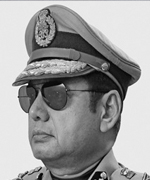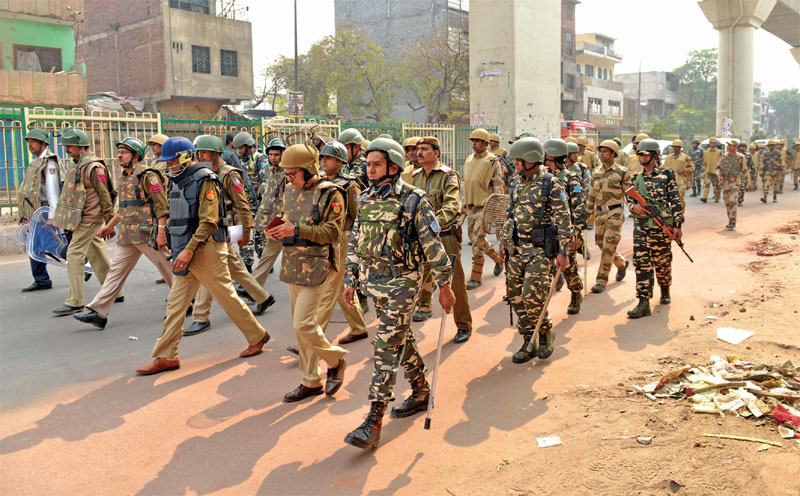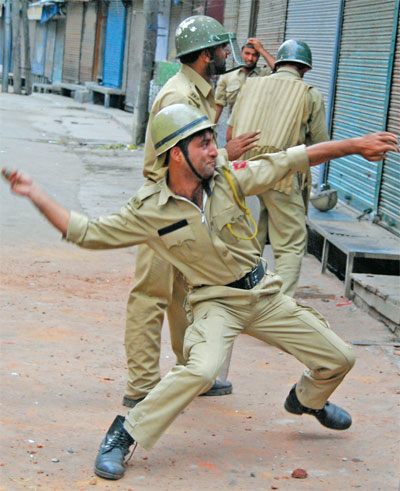A blueprint for improving police and policing in India
 Dr N. C. Asthana
Dr N. C. Asthana
Police is one of the most important instruments of governance. When this instrument fails to deliver, people start losing faith in governance itself. Therefore, a higher standard of morality and performance is expected of the police. Unfortunately, the exact opposite of this has taken place, especially since independence. Even as the nation has spent heavy amounts to ‘modernise’ the police, its mind and spirit remain the same.
What Ails the Indian Police?
Far from being the most important ‘service arm’ of the State, police have become the most ruthless ‘coercive arm’ of the State—often the biggest tormentors of the common man in general and the minorities and the underprivileged in particular, thereby eroding the faith of the most vulnerable in the criminal justice system.
Application of laws by the police has become highly discriminatory and is loaded heavily against the minorities and the poor or anybody who is perceived as dissatisfied or disagreeing with the regime. Law has, in fact, been ‘weaponised’ by the police as the most preferred tool of persecution of all those who dissent.
In a police state, as its definition goes, the government abuses its legal powers over its citizens. We have, however, become worse than a police state because the legal powers are used to ‘selectively’ target and persecute a part of the citizenry.
An analysis of the functioning of the police since independence shows that, far from upholding the law, police have been acting as the agents of communal forces and a partisan State. Majoritarian narrative is seldom questioned, and majoritarian violence is seldom punished. Riotous behaviour and hooliganism in the name of religion are taking place with increasing frequency because they know that they will perhaps never be punished.
In almost every communal riot of this country, whether it was Delhi (1984) or Delhi (2020), police have always been found to let the minorities ‘suffer’ at the hands of the majority, or ‘punished’ them by implicating them in false cases. As far as the conduct of the police is concerned, nothing at all has changed all these years, even as the country came to be ruled by political parties of different ideologies! This means that the police per se are more blameworthy than the parties in power.
A large number of judgments of acquittal, particularly related to charges of terrorism, show that innocent Muslim youths were falsely implicated, and they could get justice only after their lives, families, livelihoods, and social prestige, everything was destroyed by the unjust incarceration of up to two decades. The acquittals also prove that the police never knew who the real culprits were. This means that the act of foisting false cases in the name of national security has actually been endangering national security!
Where Does the Buck Stop?
Who is responsible for this sad state of affairs? None, but the police leadership and the State they report to. The Indian Police Service has failed the nation and the people because they are intellectually bankrupt in the first place; and secondly, because, far from taking action against the errant subordinates, they have all along been colluding with them in their horrible misdeeds so as to get their share of the booty.
Intellect, claimed to be the only justification of direct recruitment at the highest level, even if it could be shown to exist at the time of recruitment, has nothing to do with integrity, strength of character, or the desire to do one’s duty honestly and efficiently.
Police brutality and police abuse of power, for example, are not aberrations attributed to a few deviant individuals; they are the rule and this is very much a systemic failure. The system has failed because the leadership has failed. The leadership suffers both from lack of moral authority and the sensitivity needed to address the real issue of abuse of power by subordinates. This emboldens them and they commit more atrocities, thereby creating a vicious circle.

The Difficult Road to Redemption
The evils that beset the police are manifold, like the multi-headed Lernaean Hydra of Greek mythology. We must shun the quintessential Indian habit of placing all our trust and hopes in a single ‘trick’. No police reform; no institution; no Commission; no judgment; no individual; or no legislative enactment would be able to solve the multifarious problems of the police single-handedly. It would require a tremendous multi-dimensional effort.
Make Training Harder, Exams Tougher
As evident from the scathing remarks of the Supreme Court in hundreds of judgments, ignorance and professional incompetence of police officers are a matter of serious concern. The malady takes root in training itself.
Much of the business of the so-called training of IPS, SPS (State Police Service) and subordinate officers lacks substance. The current regimen leaves much to be desired both amongst the trainees and the trainers. Their knowledge of law is hopelessly poor and that of combat operations (say, for example, anti-terrorist or counterinsurgency operations) even poorer.
Training needs to be made much harder and the exams much tougher—the nation can no longer afford the fraud where no probationer ever fails. If the higher requirements of improved training cannot be met within the present period of training, the duration of training must be extended. God has not prescribed that the training must necessarily end in two years.
The current training tells them only of make-believe, highly idealized, goody-goody world of the police, which leaves them utterly ignorant of its ugly realities. Officers must have a thorough knowledge of the evils that the police do. They must know all the dirty tricks that their subordinates play. Unless they know these, they can never set out to correct them even if they develop a desire to do so.
Introduce and Enforce In-Service Exams
Government service in India, whether for cops, doctors, engineers, academicians or any other professional, works on an unstated belief that the person who has cleared the recruitment exam once, never needs to learn anything again in life. Under current rules, as held in the case of Union of India vs M.E. Reddy (1980), ‘deadwood can be weeded out’ (that is, prematurely retired on grounds of unsuitability) usually after 25 years of service or 50 years of age. However, the number of officers retired under this is extremely small. As such, government service is taken for granted.
This can be remedied only if we introduce and enforce a system of rigorous and ruthless in-service examinations with service rules amended to ensure that failure results in termination of service, not retirement. This will be the single-most important step that could literally jolt the police out of their complacent slumber.
Exemplary Punishments to Make Them Respect Law
Delinquent cops deserve a harsher punishment than other public servants because they do not commit mistakes; they commit sins. Stringent punishment is the best deterrent to ‘sins’. Service Rules must be amended accordingly. Presently, in spite of the Supreme Court judgement in the case of State of Gujarat vs Kishanbhai (2014) providing for punishment, no police officer has ever been punished in seven years for harassing innocent citizens through malicious prosecution.
Introduce a Robust System of Accountability
It is dangerous to give unfettered, unbridled powers to the police without introducing a strong system of ensuring accountability. Freedom of investigation, for example, does not mean the freedom to tweak or ‘shape’ the investigation for vested interests. The politician, however bad he might be, is accountable to the people and can be booted out of his job after his term if he does not come up to the expectations of the people. However, if the officers are committing wrongs, the people have no option but to suffer them for 30-35 years, until they retire.
Precisely for this reason, the Sheriff, that is the top law enforcement officer of a county in the USA, is an elected person and the system is working excellently since ages. In England, since 2012, the Police and Crime Commissioner is an elected official. An official statement said: ‘The police and crime commissioners are visible, they’ll be accessible, they’ve been elected and crucially they will be accountable to people through the ballot box.’
The Bogey of Political Interference
Those who collude with the politicians collude for comfort, not for survival. Most of the so-called political interference takes place because the police officers themselves offer to be ‘manoeuvred’, ‘manipulated’ or ‘used’. The bogey of political interference has been created by those who want the best of both worlds.
As long as their mutually beneficial relationship with the politicians keeps on bearing fruits, they do not utter a word. The moment they find that they are not getting the expected rewards, they start screaming of political interference. The reality is that the ‘business’ of policing in India revolves around partisan behaviour, currying of political favours for plum postings, and wielding of power, entirely overshadowing the real duties of the police.
To speak of ‘insulating the police from political interference’ implies that the bureaucracy treats itself is something inherently ‘superior’ which condescends to ‘serve’ the hoi polloi but is repeatedly thwarted in its ‘noble’ attempts by the politicians who are inherently ‘inferior’. This is a self-serving, self-congratulatory attitude. There is no basis at all for such a presumption. Politicians and government servants are products of the very same society, social milieu, education and value systems.

The Hoax of Police Reforms
The so-called police reforms have been sold to popular imagination as some sort of panacea or ‘Taranhaar’ idea; all it needs is their implementation and voila, we will have the most efficient, most humane police in the whole world in no time.
There is no evidence that implementation of the orders of the Supreme Court in the case of Prakash Singh (2006) has had the slightest effect on the functioning of the police. Every single premise of the so-called police reforms including fixed tenures for the DGP, has fallen flat on its face in the 15 years that followed the order. Even now a single citizen cannot be found who could testify that they could move the cops to do what they were legally supposed to do without the ‘grease of bribe or some sort of pressure’. If the cops have belied the expectations of the Supreme Court, the reason is that the so-called police reforms are a hoax.
To allow untrammelled jurisdiction and powers to the police in the name of independence or autonomy strikes at the very roots of the principles of responsible and accountable governance. The reformwallahs’ desire to create an ‘exclusivist’ system that seeks to ‘clip the wings’ of the ‘dirty’ politicians has ulterior motives to garner a larger share of the booty than is possible with the politicians ‘intimately’ and ‘mightily’ involved with the system.
More than the system, the man needs to change
The so-called police reforms in India seek to reform the system whereas the malady lies more with the men who work for the system. Trying to blame the system alone is to deny the obvious truth. Thus, if the police officers remain as corrupt, insensitive, ignorant, and greedy as they are, ‘insulating’ the police would only perpetuate their tyranny.
The usual refrain of police is that they are not able to render good quality service because they do not have enough resources. This is hogwash. The quality of service rendered depends more on the attitude of the cops and their professional competence. Good quality service can be rendered even with the present resources at their disposal if they have the desire to serve. The desire to deliver is more important than the means to deliver.
Changing attitudes is indeed a very tall order but a beginning has to be made somewhere. Professionalism is not merely being efficient; it lies in doing the right thing efficiently. Since professionalism has refused to come from self-motivation, it will have to be introduced by force as discussed above.
(The writer is a retired IPS officer and a former DGP of Kerala. Amongst his 49 books, he is the author of books like ‘Leadership Failure in Police’, ‘State Persecution of Minorities and Underprivileged in India’ and ‘Khaki mein ye Darinde’)

